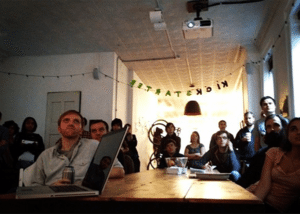This week, Kickstarter’s second full-time employee and vice president of data, Fred Benenson, announced that he is stepping down from his position with the crowdfunding giant on February 19th.
Benenson shared in a Medium post:
“‘All or nothing’ describes Kickstarter’s unique model of fundraising — creators set a funding goal and a deadline by which to hit it. If they miss the mark, no money changes hands. It has a way of really focusing a collective energy towards that single goal. It’s also a mindset that has shaped my career and philosophy working for the company.
“Now, after 2,271 days, I feel my project’s deadline has arrived, and I’ve reached my goal. It’s been an incredible and rewarding ride, and set the bar in ways that I didn’t even think possible.
“In 2009, when I joined as our second full-time employee in New York, we didn’t even have an office. That didn’t matter — I had just used the site to raise money for Emoji Dick and remember thinking that if Kickstarter could make an emoji translation of Moby Dick possible, it was clear the product and community had a bright future.
“Soon, I heard a vague description of a potential space on the Lower East Side that had a jacuzzi in it. The jacuzzi turned out to be a very large bath tub with a small crystal chandelier hanging over it — we would later use it to do our dishes since the kitchen sink was broken.
“155 Rivington was cold and empty when we arrived but warmed up as the team grew and projects rolled in. Our landlord turned out to be very flexible and would later let us take over most of the building. We also discovered that Rancid filmed the video for “Time Bomb” on the top floor.
“Early on, I was helping out as best I could, trying to pull my weight and contribute as much as possible. My previous job was at Creative Commons where I had worked in outreach and on some product ideas, but nothing had prepared me for the pace and demands of Kickstarter. It seemed like every day confronted us with a new issue to think about and a new decision to make. Suddenly the concept of being ‘in business’ and creating ‘a product’ didn’t feel so foreign — it was the consequence of good judgment, trust, great people, and focus. It’s hard to describe how invigorating that mix was: We were putting something good into the world that people wanted, and that thing was working.
“While I had studied philosophy and computer science in undergrad and graduated ITP in 2008, I didn’t arrive at Kickstarter with an interest in software or engineering. But I was determined to use my background and skills to provide value to the company, so this led me to pick up some of the weirder and less glamorous technical tasks floating around. It turned out a lot of those involved using data to answer thorny questions about what did (or did not happen) on the site.
“My early work eventually coalesced into a research and development role focused on supplying insights and building data-driven products. I wrote queries, pushed Google Analytics to its limits, published OKCupid-style blog posts with Yancey, and built lots of dashboards and graphs for our community and staff. It was captivating work, and I loved bringing data into every conversation I could. As the data scene in New York blossomed, I attended meetups and taught myself just enough statistics and math to make it all work.
“At some point I even volunteered to be our full-time recruiter. That didn’t work out so well—it turned out that my interests and skills were better suited to the product and development side of the business — but it’s to Kickstarter’s credit that we were both able to recover from that experiment.
“Most importantly, I came away from the experience with a greater appreciation of how difficult it is to recruit good people. I took what I learned and went all-in on data at Kickstarter — recruiting an incredibly talented team of data scientists, analysts, and engineers, and leading that team as our first VP of Data.
“Throughout it all, Kickstarter has never wavered from its focus and mission. Every day we get to watch people’s dreams come true. Our product, and I say this without hyperbole, changes people’s lives and creates good in the world. That mandate is not without risk, and things don’t always go smoothly with Kickstarter projects. But we’ve always leaned in and focused on trying to do the right thing.
“These principles distinguish Kickstarter from its peers in the technology world, and our recent reincorporation as a Public Benefit Corporation has further cemented that distinction.
“Kickstarter opened my eyes to how a for-profit company could both do well and do good — previously I was convinced the only way to make the world a better place was to work in the nonprofit or government sector. I now know that’s not true.”
Benenson went on to reveal what he learned throughout his Kickstarter experience:
- Data work consists primarily of a) counting things b) figuring out the denominator and c) the reproducibility of a) and b)
- The more you can work with someone to help refine their question the easier it will be to answer
- Reconciling similar data from two different sources (e.g. “Why does Google Analytics say X when Mixpanel says Y?”) has diminishing returns and should be avoided unless necessary
 Conducting a randomized controlled experimentvia an A/B test is always better than analyzing historical data
Conducting a randomized controlled experimentvia an A/B test is always better than analyzing historical data- The number of times you will be both pleasantly and significantly surprised by the results of a test or research will be small
- Relatedly, embracing test results that confirm a null hypothesisis good for team morale
- Logistic RegressionRules Everything Around Me
- Metrics are crucial to the story a company tells itself; it is essential to honestly and rigorously define them
- Sometimes explaining data is more about managing uncertainty than saying anything exciting
- Good experimental design is difficult; don’t allow a great testing framework to let you get lazy with it
- Data science (A/B testing, etc.) can help you how to optimize for a particular outcome, but it will never tell you which particular outcome to optimize for
- Always seek to record and attain data in its rawest form, whether you’re instrumenting something yourself or retrieving it from an API
- New hires love knowing there’s a house style guide, so it’s worth investing in maintaining them for your primary languages (SQL, R, etc.)
He then added:
“Someone once told me never to get too comfortable. And that’s actually a large part of the reason why I decided it was time — a lot of the things I set out to do early in Kickstarter history feel complete. We’ve built our own data infrastructure, we have tremendous capacity for doing research and hypothesis testing, and data now informs virtually every decision inside the company, from the senior team to our community support.
“February 19 will be my final day, but until then I will be helping out searching for my replacement.”






